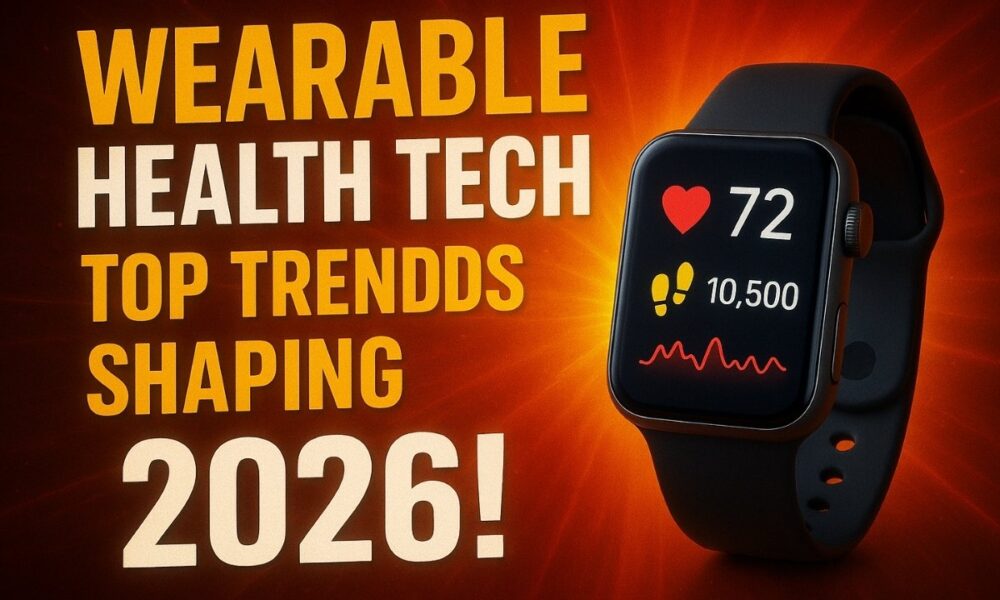Gadgets
Wearable Health Tech | Top Trends Shaping 2026!

The wearable health tech industry is entering an exciting new phase in 2026. What started as simple step counters and calorie trackers has now transformed into a sophisticated ecosystem of devices powered by artificial intelligence, advanced biometric sensors, and seamless connectivity. These modern innovations are making wearables not only more accurate but also more versatile, giving individuals greater control over their health than ever before.
Today’s wearable devices go far beyond fitness tracking. They can provide real-time health monitoring, early illness detection, and even personalized wellness recommendations tailored to each individual’s body and lifestyle. From professional athletes striving to optimize their performance to everyday health-conscious individuals focused on long-term well-being, wearable health technology has become an essential part of modern living.
Top Wearable Health Tech Trends in 2026
| Trend | Description | Examples | Benefits |
|---|---|---|---|
| AI-Driven Health Monitoring | Devices powered by AI analyze continuous streams of health data, detect anomalies, and predict potential risks before they become serious. | WHOOP 5.0, Fitbit Sense 3 | Early illness detection, personalized health insights, proactive health management |
| Advanced Sleep Tracking | New-generation wearables offer comprehensive sleep cycle analysis, detect sleep disorders, and provide recovery recommendations based on body strain. | Oura Ring Gen 4, Apple Watch Ultra 2 | Better sleep quality, improved athletic recovery, enhanced mental clarity |
| Blood Sugar Monitoring without Needles | Non-invasive glucose tracking solutions allow diabetic and health-conscious users to monitor blood sugar in real time, without painful finger pricks. | GlucoTrack, Dexcom G7 Wearable | Pain-free monitoring, real-time alerts, preventive diabetes management |
| Integrated Stress Management | Devices with stress sensors track heart rate variability and cortisol indicators, offering guided breathing and mindfulness exercises. | Garmin Venu 3, Fitbit Charge 6 | Reduced stress, improved mental wellness, balanced lifestyle |
| Eco-Friendly Wearables | Wearables made with recycled materials, solar-powered charging, and energy-efficient processors that reduce environmental impact. | Solar-powered Garmin models | Sustainable lifestyle, longer battery life, eco-conscious technology |
Why These Innovations Matter
The significance of these advancements lies in their ability to empower individuals to take charge of their health before issues escalate. For instance, AI-powered monitoring can alert users to irregular heart rhythms, while non-invasive glucose monitors can provide diabetic patients with the freedom of painless and continuous tracking. Stress-management features are especially vital in today’s fast-paced environment, offering tools to maintain balance between work and personal life.
Moreover, the integration of wearable data with telehealth platforms is bridging the gap between patients and healthcare providers. Doctors can now receive accurate, long-term data rather than relying solely on clinic visits, enabling faster diagnoses and more effective treatment plans. This trend signals a shift from reactive to proactive healthcare, where prevention and early detection play a central role.
The Rise of Personalized Wellness
Another major trend shaping the industry is personalization. With AI algorithms learning from each individual’s data over time, recommendations are no longer generic. Instead, users receive tailored insights, such as when to rest, what type of exercise to prioritize, or how to adjust daily habits for better long-term health outcomes.
For professional athletes, this means optimizing training loads to prevent injury. For corporate employees, it might mean stress-reduction reminders during peak work hours. For older adults, wearables can monitor vital signs and send alerts to caregivers in case of abnormalities. The potential applications are vast and deeply impactful.
Sustainability Meets Technology
Sustainability is another area gaining traction in 2026. As consumers become more eco-conscious, companies are responding with biodegradable materials, solar charging, and energy-efficient chips that extend device life while reducing environmental impact. These eco-friendly designs not only align with global sustainability goals but also enhance practicality by offering longer battery life — a common pain point for wearable users.
Conclusion
In 2026, wearable health technology is no longer about simply counting steps or tracking calories — it has become a comprehensive health companion. With cutting-edge AI integration, advanced biometric sensors, and sustainable designs, these devices are setting new benchmarks for personal healthcare.
Whether you’re a fitness enthusiast pushing performance limits, a busy professional striving to balance health and work, or someone focused on preventive care, there’s a wearable device tailored to your unique needs. As this industry continues to evolve, wearables will not just monitor our health — they will help shape healthier, smarter, and more sustainable lifestyles for the future.